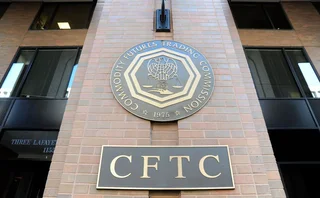
CDS spreads tighten as bailout is revised
The cost of protection on some of the world’s largest financial institutions fell yesterday as the US Senate agreed to vote on a revised version of the $700 billion financial rescue plan.
The Credit Derivatives Research Counterparty Risk Index, which averages the five-year credit default swaps (CDS) spreads of the 15 largest credit derivatives dealers, dropped to 359.7 basis points yesterday, down from 372bp on Monday.
Wachovia, which was bought by rival Citi on September 29, saw its five-year credit CDS spreads tighten to 363.8 basis points yesterday from 438.8bp the day before, according to Bloomberg data. CDSs referencing Citi tightened to 286.2bp, from 322.5bp over the same period.
The cost of protection on Goldman Sachs, which, along with Morgan Stanley, applied to the US Federal Reserve to become a bank holding company on September 22, fell to 428.3bp by close of trading yesterday, from 475.8bp the day before. But Morgan Stanley’s CDS spreads, which traded at 918.4bp on Monday, widened to 963.7bp.
Bank of America saw its CDS spreads tighten to 151.7bp yesterday from 160.8bp on Monday, and the cost of protection on JP Morgan dropped from 152.5.8bp to 141.7bp. Meanwhile, the cost of protection on insurance giant American Insurance Group widened to 1418.9bp from 1368bp.
In Europe, the cost of protection on the Royal Bank of Scotland fell to 287.9bp yesterday from 299.6bp on Monday, while CDSs on UK banking giant HBOS – set to be taken over by domestic rival Lloyds TSB – tightened to 312.5bp from 321.7bp. The cost of protection on Lloyds TSB also fell, from 216.7bp to 182.2bp.
CDSs on Barclays widened from 263.4bp on September 29 to 267.5bp yesterday.
Franco-Belgian bank Dexia, which received a £5 billion bailout package from the Belgian, French and Luxembourg governments yesterday, saw its CDS spreads tighten to 425bp from 550bp on Monday. The cost of protection on pan-European financial services group Fortis, which was partly nationalised over the weekend, fell from 416.7bp to 326.7bp.
The US Congress voted against the Treasury department’s economic rescue legislation on Monday, causing equity markets to slump. However, the Senate agreed yesterday to vote on a revised version of the plan tonight. Several additions have been made - including temporarily raising the limit on federal deposit insurance to $250,000 from $100,000.
See also: CDS spreads push out as bailout drags on
Only users who have a paid subscription or are part of a corporate subscription are able to print or copy content.
To access these options, along with all other subscription benefits, please contact info@risk.net or view our subscription options here: http://subscriptions.risk.net/subscribe
You are currently unable to print this content. Please contact info@risk.net to find out more.
You are currently unable to copy this content. Please contact info@risk.net to find out more.
Copyright Infopro Digital Limited. All rights reserved.
As outlined in our terms and conditions, https://www.infopro-digital.com/terms-and-conditions/subscriptions/ (point 2.4), printing is limited to a single copy.
If you would like to purchase additional rights please email info@risk.net
Copyright Infopro Digital Limited. All rights reserved.
You may share this content using our article tools. As outlined in our terms and conditions, https://www.infopro-digital.com/terms-and-conditions/subscriptions/ (clause 2.4), an Authorised User may only make one copy of the materials for their own personal use. You must also comply with the restrictions in clause 2.5.
If you would like to purchase additional rights please email info@risk.net
More on Regulation
Driving IT resilience through managed services
How Murex is supporting financial institutions with managed services and providing strategic solutions
US Basel equivalence questioned as EU patience wears thin
MEPs say unfaithful US implementation of Basel III could trigger review of access to EU markets
The Term €STR transition: challenges and market readiness
The progress, challenges and factors shaping the adoption of Term €STR as financial institutions transition from Euribor
CFTC takes red pen to swaps rules, but don’t call it a rollback
Lawyers and ex-regs say agency is fine-tuning and clarifying regulations, not eliminating them
EU edges closer to calming FRTB fund-linked fray
Dealers say temporary solution is a step in the right direction but won’t fully resolve all issues
European Commission changes tune on proposed FRTB multiplier
Banks fear departure from original diversification factor undermines case for permanent relief
Supervisors should be mindful of geopolitical risks, says IMF
Shock events cause sizeable swings in asset pricing, institution’s latest report highlights
Bowman won’t commit to stress-testing the tariff shock
Nominated Fed vice-chair stonewalls calls to run ad hoc scenario similar to 2020 Covid test







